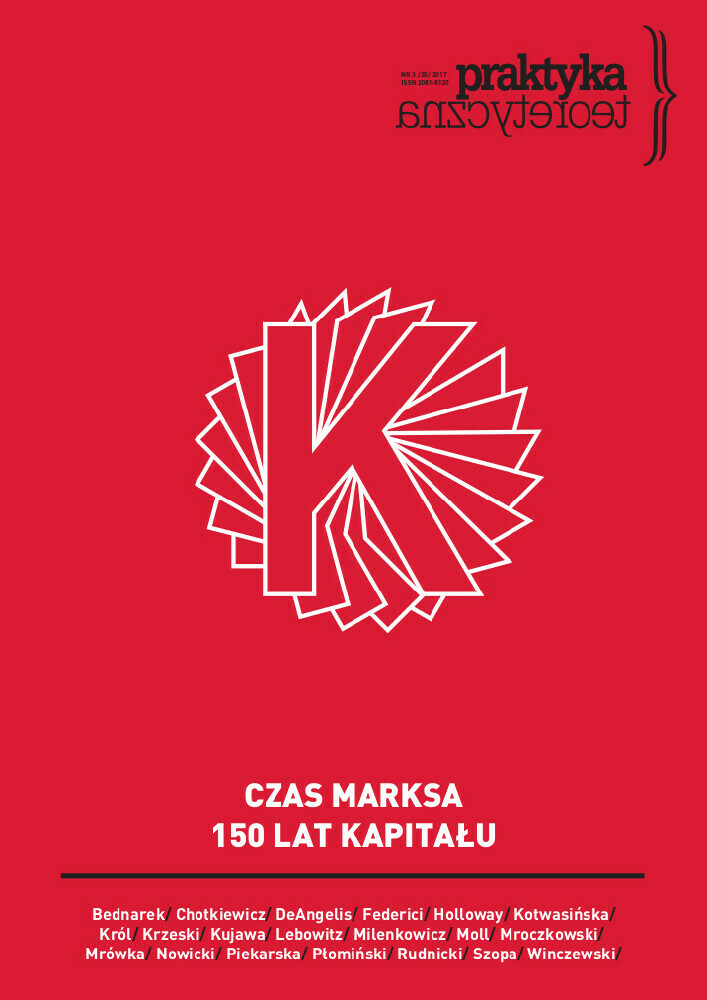Abstract
This text attempts to reveal the relationship between Marx’s thought and the ontology of desire presented in Anti-Oedipus. Its key mode of operation, allowing exposure of the relationship between these two philosophical projects, will consist of omitting any references to psychoanalysis. Thus, the basic concepts forming the theoretical grid of Anti-Oedipus – concepts such as desire, body, unconsciousness, code, lack, and even Oedipus – will be explained without reference to the writings of Freud, Lacan and Melanie Klein. Too much time has been devoted to these last-named, as a result narrowing down the circle of recipients of Deleuze and Guattari’s work. It seems that the communication block was created primarily between Anti-Oedipus and the Marxist milieu (not counting a few minor exceptions). This is a channel that should finally be made available.References
Deleuze, Gilles, i Félix Guattari. 2017. Anty-Edyp. Kapitalizm i schizofrenia, tom 1. Tłum. T. Kaszubski. Warszawa: Wydawnictwo Krytyki Politycznej.
Harvey, David. 2017. Przewodnik po »Kapitale« Karola Marksa. Część 1. Tłum. Krystian Szadkowski. Poznań: Wydawnictwo Ekonomiczne Heterodox.
Marks, Karol. 1950. Kapitał. Krytyka ekonomii politycznej. Tom 1. Księga 1. Tłum. zbiorowe. Warszawa: Książka i Wiedza.
Rudnicki, Cezary. 2015. „Deleuze i Guattari o dwóch zagrożeniach”. Kronos. Metafizyka, kultura, religia 4: 50–66. (https://www.academia.edu/24429858/Deleuze_i_Guattari_o_ dw%C3%B3ch_zagro%C5%BCeniach, data dostępu: 04.07.2017).
Swianiewicz, Jan. 2014. Możliwość makrohistorii. Braudel, Wallerstein, Deleuze. Toruń/Warszawa: Wydawnictwo Naukowe Uniwersytetu Mikołaja Kopernika.
Tronti, Mario. 2013. „Fabryka i społeczeństwo”. Tłum. Sławomir Królak. http://www.praktykateoretyczna.pl/mario-tronti-fabryka-i-spoleczenstwo/ (data dostępu: 04.07.2017).
License
“Theoretical Practice” seeks to put into practice the idea of open access to knowledge and broadening the domain of the commons. It serves the development of science, thinking and critical reflection. The journal is published in open-access mode under the CC-BY-NC-SA 4.0 license (detail available here: http://creativecommons.org/licenses/by-nc-sa/4.0/). Articles published in the journal may be freely distributed, stored, printed and utilized for academic and teaching purposes without restrictions.
They should not be, however, used for any commercial purposes or be reconstructed into derivative creations. Access to the journal may not be limited or offered for a fee by any third party.
Prospective authors are obliged to fill in, sign and send back the publishing contract compliant with the CC licencing. [PL.pdf, PL.doc, EN.pdf,EN.doc].
According to this contract, authors grant the journal a non-exclusive right to publish their work under the creative commons license (CC-BY-NC-SA 4.0) without any financial obligation on both sides of the contract.
Before submission authors should make sure that derivative materials they use are not protected by copyright preventing their non-commercial publication. Authors are responsible for any respective copyright violations.
